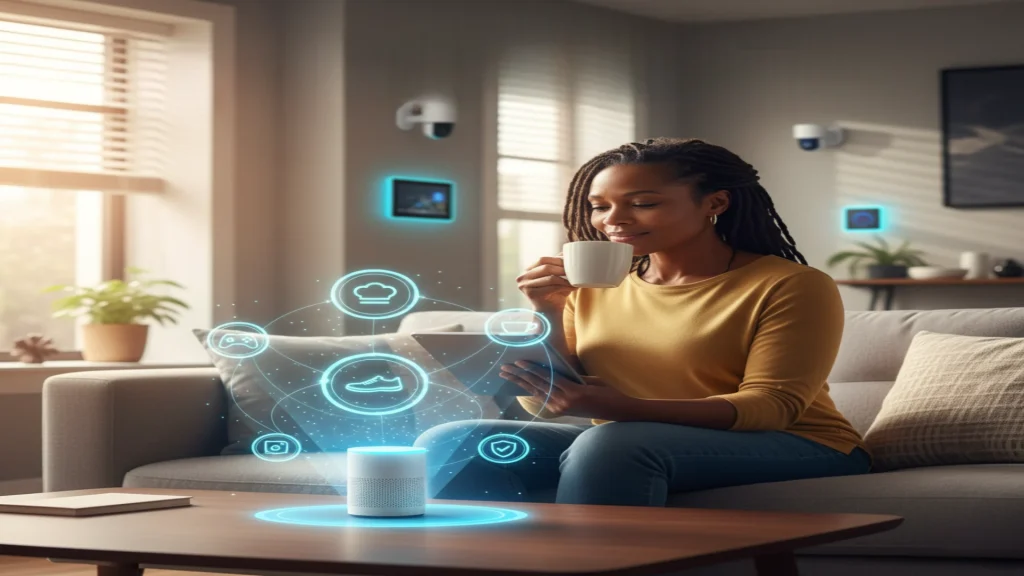Alexa How Does It Work? that’s probably the first question that popped into your head after hearing her respond so casually to “Alexa, play some music.” I’ll admit — the first time I tried it, I didn’t expect her to actually listen. But she did… and then she kept listening (maybe a little too well).
If you’ve ever caught yourself wondering how Alexa understands your voice, answers your random midnight questions, or even turns off the lights when you’re already in bed, you’re not alone. Alexa might feel like magic, but there’s some serious technology behind that calm, polite voice.
In simple terms, Alexa is powered by artificial intelligence that listens, processes, and responds to your voice using something called Natural Language Processing (NLP). When you speak, Alexa doesn’t just hear words — she interprets meaning. That’s how she knows when you say “turn on the lights,” you’re not asking for the definition of “light.”

What Exactly Is Alexa?
Before diving into how she works, let’s get one thing straight — Alexa isn’t magic (though it feels that way sometimes).
She’s Amazon’s virtual assistant — an AI system designed to understand speech, interpret commands, and carry out tasks like playing music, setting alarms, or controlling smart devices.
Think of Alexa as your helpful digital roommate — the kind who never forgets your reminders but occasionally misunderstands your accent.
The Magic Starts With Wake Words
When you say “Alexa,” that’s the wake word.
Your Echo device isn’t recording every conversation (contrary to what your paranoid cousin says). It’s just waiting for that one word to “wake up” and start listening.
Once Alexa hears her name, your voice command gets recorded and sent securely to Amazon’s servers for processing.
From there, artificial intelligence does the heavy lifting — interpreting what you meant, not just what you said.
Example:
If you say, “Alexa, turn on the lights,” she knows you’re not asking for the definition of “light.”
The Cloud Does the Thinking
This is where the real work happens.
After you speak, Alexa sends your audio to Amazon Web Services (AWS) — basically the brain of Alexa that lives in the cloud.
AWS uses Natural Language Processing (NLP) and Machine Learning (ML) to figure out your intent.
It matches your words to possible actions, checks your preferences, and responds almost instantly.
To you, it feels seamless. Behind the scenes? Billions of micro-decisions happen in milliseconds.
That’s faster than me deciding whether to hit snooze or actually get up.
Alexa and Your Smart Home
Now, this is where things get interesting.
Alexa isn’t just about answering trivia questions — she can control smart home devices, from lights and cameras to thermostats and locks.
When you say, “Alexa, show me the front door,” she communicates with your connected security camera (like the ones I reviewed in my post on cheap outdoor security cameras) and streams the feed right to your Echo Show.
You can even integrate Alexa with devices that don’t rely on Wi-Fi — if you’re curious how that works, check my post on do security cameras need WiFi.
This level of connectivity is what makes Alexa feel like a central control hub — the “brain” of your smart home.

How Alexa Understands You (Even With Your Accent)
One of the smartest parts of Alexa’s system is speech recognition.
She learns from millions of voice samples to improve over time — including accents, background noise, and even the way you phrase things.
So if I mumble “Alexa, set a timer for the rice,” she still gets it.
Though, to be fair, she once thought I said “set a tiger for the rice.” Close enough.
Each time you speak, Alexa analyzes patterns and adjusts to your voice.
That’s why she gets smarter the more you use her — not creepier (despite what memes say).
Privacy and Security: What’s Really Going On
I get it — talking to a device that “listens” all day sounds a little unsettling.
But Amazon allows you to delete your voice recordings and review what Alexa has stored.
Alexa uses your data to improve accuracy, not to spy on your late-night snack orders.
Still, it’s good practice to review your privacy settings once in a while.
You can even say, “Alexa, delete what I just said.”
Simple, right? Even Alexa deserves boundaries.
Fun Things You Can Ask Alexa
Okay, enough of the tech talk — let’s have a little fun.
Alexa isn’t just about weather updates or timers. She’s got personality.
Try these:
-
“Alexa, tell me a joke.”
-
“Alexa, beatbox.”
-
“Alexa, who’s your favorite robot?”
She might surprise you. Some of her answers are genuinely funny — others are so bad, they’re good.
Alexa Skills: Like Apps, But for Your Voice
Alexa has Skills — voice-powered apps that expand what she can do.
You can enable Skills for games, fitness routines, recipes, or even smart home automation.
For example, you can connect Alexa to your home security system and get alerts straight through your Echo device.
If you’re into optimizing your setup, I’ve shared placement tips in my guide on best places to put security cameras.
With the right Skills, Alexa can practically run your home while you just sit back and enjoy your coffee.

Alexa’s Integration With Other Devices
Alexa plays well with others — she connects to devices like Zmodo, Wyze, and Blink (yep, some of my favorite budget-friendly brands).
You can link multiple systems and control them with simple commands.
It’s not just about smart speakers anymore — it’s your smart ecosystem.
Alexa becomes the voice that ties everything together.
Should You Use Alexa in 2025?
If you like convenience, automation, and voice control, absolutely yes.
Alexa’s technology keeps improving — faster responses, smarter integrations, and more personalization.
But it’s not for everyone.
If you’re super private or hate talking to gadgets, you might prefer a more manual setup.
For me, Alexa has become part of my daily routine — from turning on my lights to reminding me not to burn dinner.
She’s not perfect, but she’s definitely helpful.
Quick Tips for Better Alexa Performance
-
Keep your device near the center of your home
-
Avoid noisy spots (like near a fan or TV)
-
Regularly check for software updates
-
Use clear, short commands
-
Customize Alexa Routines for daily tasks
Conclusion
So, how does Alexa work?
It’s a mix of smart microphones, cloud computing, and machine learning — all working together to understand you and make your life a little easier.
From controlling cameras to cracking jokes, Alexa does more than just follow commands.
She adapts, learns, and fits into your home in ways that feel surprisingly natural.
Sure, sometimes she misunderstands you. But honestly, so do humans — and Alexa doesn’t hold grudges.
Frequently Asked Questions (FAQs)
1. Does Alexa always listen?
No. She only activates after hearing the wake word (“Alexa”).
2. Can Alexa work without Wi-Fi?
Most features need an internet connection, though some limited offline commands work on newer devices.
3. Can I connect Alexa to my home cameras?
Yes, if your camera supports Alexa integration — check out my reviews of compatible cameras here.
4. Is Alexa safe to use?
Yes, as long as you manage privacy settings and review your voice data regularly.
5. Can Alexa control multiple devices?
Definitely. Lights, locks, thermostats — even your coffee maker. She’s that efficient.
